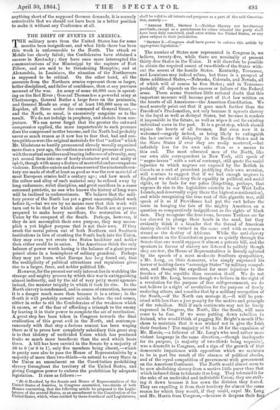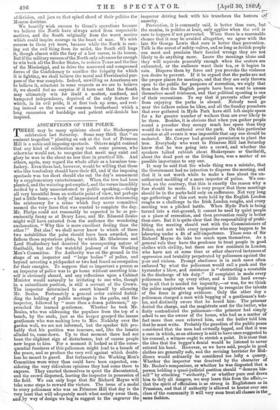THE DRIFT OF EVENTS IN AMERICA.
THE military news from the United States has for some months been insignificant, and what little there has been this week is unfavourable to the North. The attack on Mobile has clearly failed ; the Confederates have obtained a success in Kentucky ; they have once more interrupted the communications of the Mississippi by the capture of Fort Pillow, and are said to be threatening Memphis ; and at Alexandria in Louisiana, the situation of the Northerners is supposed to be critical. On the other hand, all the accounts from the Northern armies represent them as larger, better disciplined, and fuller of confidence, than at any previous moment of the war. An army of some 40,000 men is operat- ing on the Red River ; General Thomas has a powerful army at Chattanooga, General Butler a large force on the peninsula, and General Meade an army of at least 180,000 men on the Rapidan, all three under the command of General Grant,— and the North, as usual, is excessively sanguine as to the result. We do not indulge in prophecy, and abstain from con- jecture. We can never forget that the greater the outward compression applied, the more impenetrable to such pressure does the compressed matter become, and the North had probably never so much reason as it now has to fear that, bad and con- temptible as were the original materials for that "nation" which Mr. Gladstone so hastily pronounced already morally organized more than a year ago, the continuous external pressure of years, with the mutual sacrifices and bracing influence of adversity, may yet anneal them into one of hardy character and real unity of spirit, though with many a feature of masterful andunscrupulous violence. Even fire-eaters and slaveowners of the nineteenth cen- tury are made of stuff at least as good as was the raw material of most European armies half a century ago ; and how much of the refuse and alloy of such material may be refined away by long endurance, strict discipline, and great sacrifices in a cause esteemed patriotic, no one who knows the history of long wars will be inclined to underestimate. We believe that the mili- tary power of the North has yet a great unaccomplished work before it,—but we are by no means sure that this work will -turn out to be that for which alone the North are at present prepared to make heavy sacrifices, the restoration of the Union by the conquest of. the South. Perhaps, however, if they do not accomplish their own purpose, they may accom- plish a yet higher purpose that is not their own. If they crush the moral poison out of both Northern and Southern institutions in lieu of crushing the South back into the Union, they may even yet create two States healthier and nobler than either could be in union. The Americans think the only balance of power worth having is the balance of a giant power poised alone in a hemisphere of solitary grandeur. Perhaps they may yet learn what Europe has long found out, that the multiplicity of political attractions and repulsions gives rise to a larger, freer, and nobler political life.
However, for the present our only interest lies in watching the strange and mighty process by which this war is extinguishing almost indirectly, and by the aid of very petty moral agencies indeed, the monster iniquity in which it took its rise. In the North slavery is condemned, and in course of execution, because it is a danger much more than because it is a crime ; in the South it will probably commit suicide before the end comes, either in order to rid the Confederates of the weakness which it causes, or of the fear of affording a triumph to the enemy by leaving it in their power to complete the act of retribution. A great step has been taken in Congress towards the final eradication of this great evil in the North,, and contempo- raneously with that step a furious contest has been waging there as if to prove how completely subsidiary this great step is to that idolatry of undivided Union which has produced fruits so much more beneficent than the seed which bears them. I bill has been carried in the Senate by a majority of 38 to 6 (or 6 to 1), only five members being absent,—which is pretty sure also to pass the House of Representatives by a majority of more than two-thirds—to submit to every State in the Union an amendment on the Constitution prohibiting slavery throughout the territory of the United States, and giving Congress power to enforce the prohibition by adequate legislation. It runs as follows :— " Be it Resolved, by the Senate and Rouse of Representatives of the United States of America, in Congress assembled, two-thirds of both Houses concurring, that the following article be proposed to the Legis- latures of the several States, as an amendment to the Constitution of the United States, which, when ratified by three-fourths of said Legislatures,
shall be valid to all intents and purposes as a part of the said Constitu- tion, namely :— " Awn= XIII., Sacriox 1.—Neither Slavery nor involuntary servitude, except as a punishment for crime whereof the party shall have been duly convicted, shall exist within the United States, or any place subject to their jurisdiction.
" SzerioN 2.—Congress shall have power to enforce this article by appropriate legislation."
The number of States now represented in Congress is, we believe, twenty-five, while there are nominally at present thirty-five States in the Union. It will therefore be possible to obtain the required assent of two-thirds of the States with- out the assent of the hostile States. Kentucky, Tennessee, and Louisiana may indeed refuse, but there is a prospect of three additional States,—Nebraska, Colorado, and Nevada, all of which will of course be free States ; and in Tennessee probably all depends on the success or failure of the Federal arms. There seems therefore little rational doubt that this important measure will become part of that law written on the hearts of all Americans—the American Constitution. We need scarcely point out that it goes much further than the President's Proclamation, not only because it uproots slavery in the loyal as well as disloyal States, but because it renders it impossible in the future, as well as wipes it out for existing individual cases in the past. It is a great step, which should rejoice the hearts of all freemen. But even now it is welcomed—eagerly indeed, as being likely to extinguish the last embers of disloyalty in the Border States and in the Slave States if ever they are really mastered,—but infinitely less for its own sake than as a means to this end. The most educated men of the North, like our own able correspondent in New York, still speak of " negro-lovers " with a sort of contempt, still quote the social injustice to which negroes are exposed by the British in Canada as a sort of precedent justifyins.° their own aversion, still venture to suggest that if we had enough nesToes in England we should deny their equality in political and social rights, or be fools for our pains (forgetting, perhaps, that nes-roes do rise to the legislative councils in our West India Islands, and deservedly enjoy there the highest consideration), and while recognizing the true root of this gigantic war, still speak of it as if Providence had put the cart before the horse in hanging the fate of the mighty American on a question so comparatively insignificant as the rights of black men. They recognize the true issue, because Yankees are far too shrewd to plunge their heads in the sand, but they evidently think it a blunder that the thread of American destiny should be twined in the same cord with so coarse a strand as the destiny of Africans. While the anti-slavery amendment on the Constitution passes so quietly through the Senate that one would suppose it almost a private bill, and the speakers in favour of slavery are listened to politely though they are few, the House of Representatives is fiercely agitated by the speech of a most moderate Southern sympathizer, a Mr. Lens-°, an Ohio democrat, who simply expressed his horror of holding down "sovereign States" by military compul- sion, and thought the expedient far more injurious to the freedom of the republic than secession itself. We do not hold with Mr. Long, because though we believe in the right of a revolution for the purpose of free self-government, we do not believe in a right of revolution for the purpose of freely enslaving others, and consider Chat by a military occupation of the South,—.if the North can manage it,—it will be pun- ished with less than a just penalty for the motive and principle of the rebellion. Still if such sentiments may not be freely expressed in Congress, the North, like the South, will soon cease to be free. If we were putting down rebellion in Ireland, who would think of gagging Mr. Bright's mouth if he chose to maintain that it was wicked not to give the Irish their freedom ? The majority of 81 to 58 for the expulsion of Mr. Harris,—a follower of Mr. Long's who used rather more violent language in the same direction,—though inadequate for its purpose, (a majority of two-thirds being requisite), was a discredit to Congress and a sign of the growth of that democratic impatience with opposition which we maintain to be in part the result of the absence of political checks, and of the equal competition of government with government on the American Continent. The North would almost seem to be now abolishing slavery from a motive little purer than that which induced them to tolerate it so lows. They tolerated it for the sake of an undivided and indivisible Union; they are strik- ing it down because it has sown the division they feared. They are expelling it from their territory for almost the same reason for which they would, if they could, expel Mr. Long and Mr. Harris from Congress,—because it deepens their fea of division, and jars on that spinal chord of their politics the Monroe doctrine.
We heartily wish success to Grant's operations because we believe the North have always acted from respectable motives, and the South originally from the worst motive which could inspire courage in the heart of man. We wish success to them yet more, because while the North is cast- ing out the evil thing from its midst, the South still hugs it, though almost with the fury of a last caress, to its bosom. But if the military success of the North only advances far enough to win back all the Border States, to redeem Texas and the line of the Mississippi, and to drive the narrowed and compressed forces of the Confederacy to sacrifice the iniquity for which it is fighting, we shall believe the moral and Providential pur- pose of the war complete. Indeed, unwilling as Americans are to believe it, reluctant in some respects as we are to believe it, we should feel no surprise if it turn out that the South may ultimately win for itself a modest, confined, and hampered independence, deprived of the only feature for which, in its evil pride, it at first took up arms, and rest- ing instead on the sense of common brotherhood which a long succession of hardships and patient self-denials has inspired.



































 Previous page
Previous page